Fostering Dignity and Respect - Case Study
VerifiedAdded on 2022/08/16
|13
|4126
|16
AI Summary
Contribute Materials
Your contribution can guide someone’s learning journey. Share your
documents today.
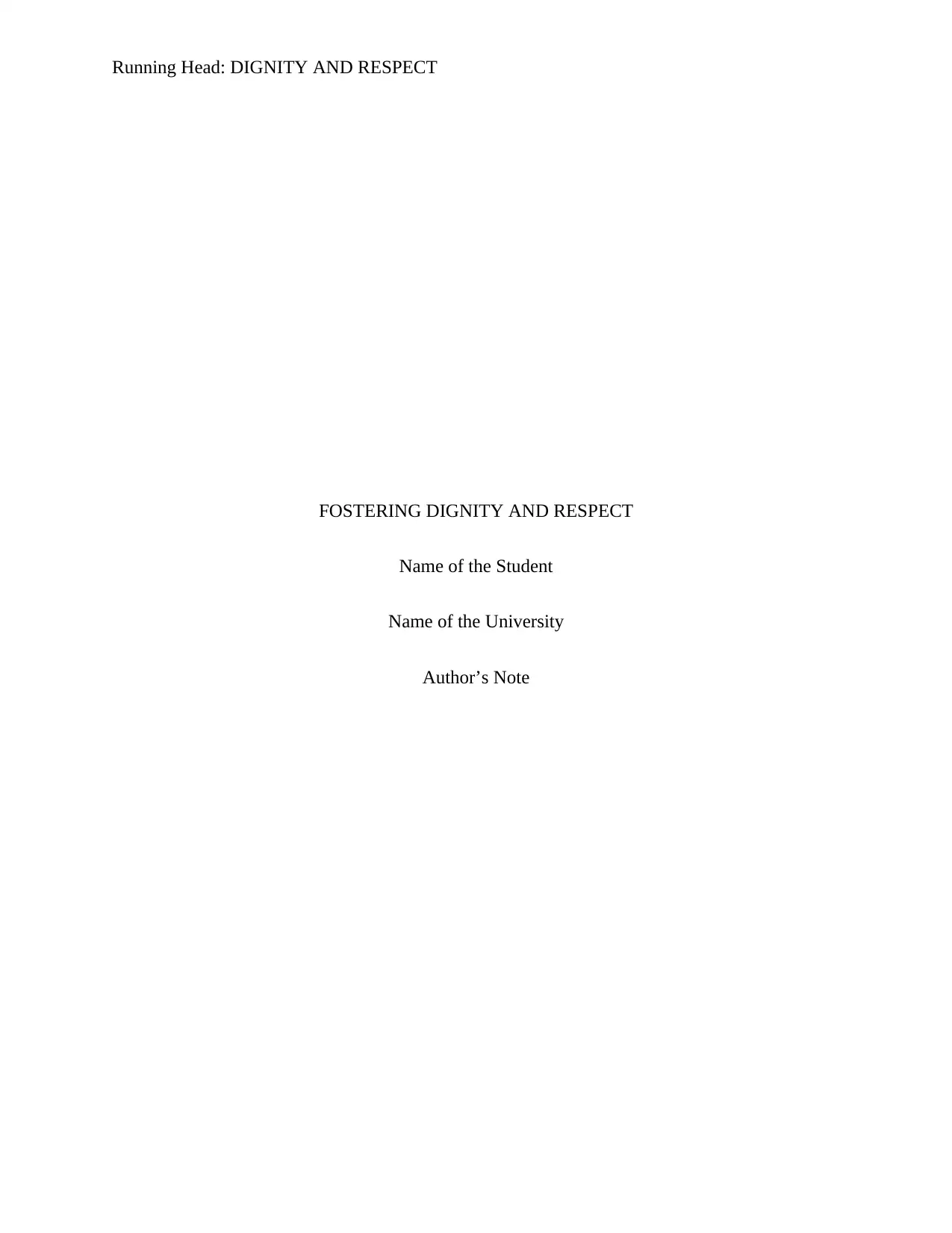
Running Head: DIGNITY AND RESPECT
FOSTERING DIGNITY AND RESPECT
Name of the Student
Name of the University
Author’s Note
FOSTERING DIGNITY AND RESPECT
Name of the Student
Name of the University
Author’s Note
Secure Best Marks with AI Grader
Need help grading? Try our AI Grader for instant feedback on your assignments.
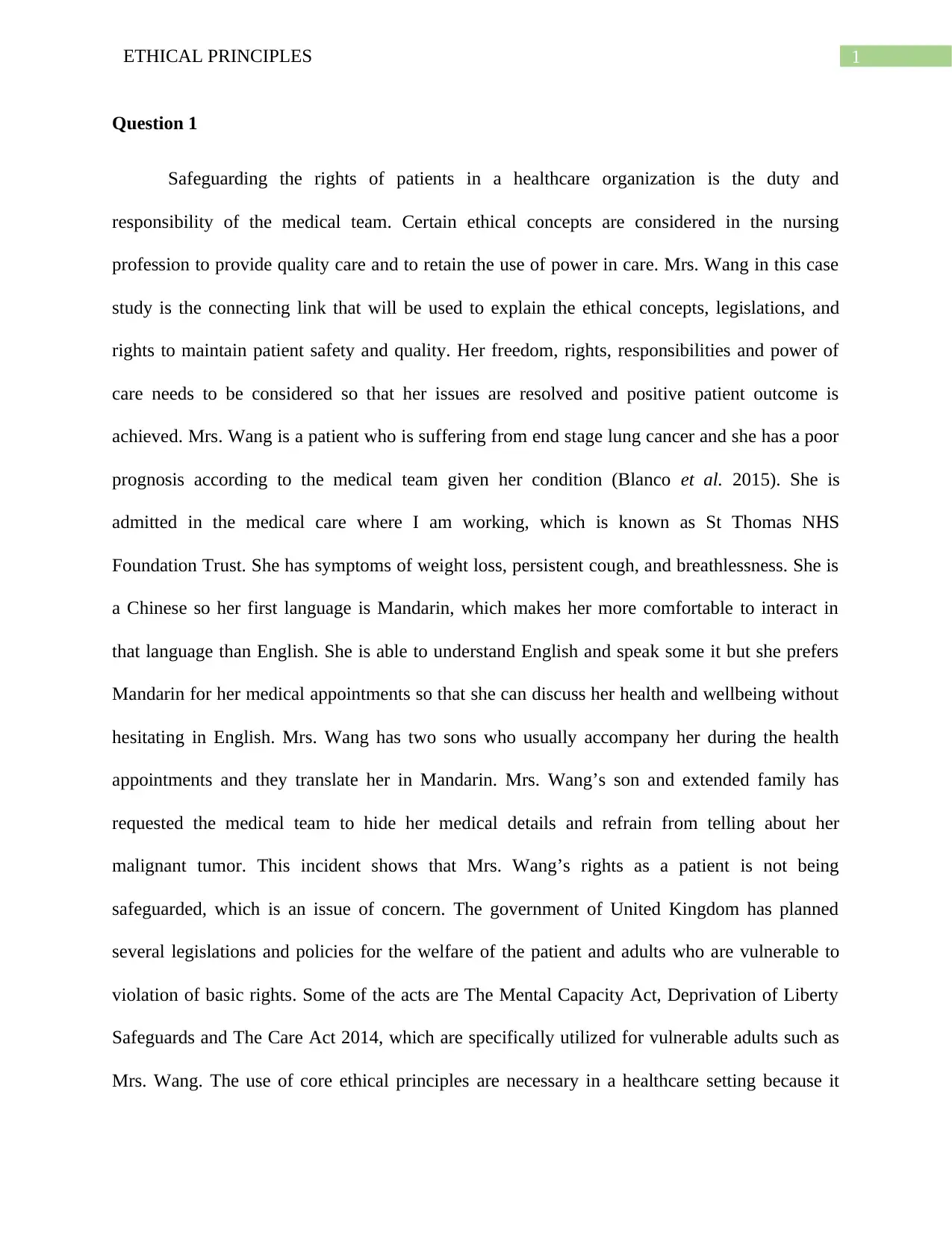
1ETHICAL PRINCIPLES
Question 1
Safeguarding the rights of patients in a healthcare organization is the duty and
responsibility of the medical team. Certain ethical concepts are considered in the nursing
profession to provide quality care and to retain the use of power in care. Mrs. Wang in this case
study is the connecting link that will be used to explain the ethical concepts, legislations, and
rights to maintain patient safety and quality. Her freedom, rights, responsibilities and power of
care needs to be considered so that her issues are resolved and positive patient outcome is
achieved. Mrs. Wang is a patient who is suffering from end stage lung cancer and she has a poor
prognosis according to the medical team given her condition (Blanco et al. 2015). She is
admitted in the medical care where I am working, which is known as St Thomas NHS
Foundation Trust. She has symptoms of weight loss, persistent cough, and breathlessness. She is
a Chinese so her first language is Mandarin, which makes her more comfortable to interact in
that language than English. She is able to understand English and speak some it but she prefers
Mandarin for her medical appointments so that she can discuss her health and wellbeing without
hesitating in English. Mrs. Wang has two sons who usually accompany her during the health
appointments and they translate her in Mandarin. Mrs. Wang’s son and extended family has
requested the medical team to hide her medical details and refrain from telling about her
malignant tumor. This incident shows that Mrs. Wang’s rights as a patient is not being
safeguarded, which is an issue of concern. The government of United Kingdom has planned
several legislations and policies for the welfare of the patient and adults who are vulnerable to
violation of basic rights. Some of the acts are The Mental Capacity Act, Deprivation of Liberty
Safeguards and The Care Act 2014, which are specifically utilized for vulnerable adults such as
Mrs. Wang. The use of core ethical principles are necessary in a healthcare setting because it
Question 1
Safeguarding the rights of patients in a healthcare organization is the duty and
responsibility of the medical team. Certain ethical concepts are considered in the nursing
profession to provide quality care and to retain the use of power in care. Mrs. Wang in this case
study is the connecting link that will be used to explain the ethical concepts, legislations, and
rights to maintain patient safety and quality. Her freedom, rights, responsibilities and power of
care needs to be considered so that her issues are resolved and positive patient outcome is
achieved. Mrs. Wang is a patient who is suffering from end stage lung cancer and she has a poor
prognosis according to the medical team given her condition (Blanco et al. 2015). She is
admitted in the medical care where I am working, which is known as St Thomas NHS
Foundation Trust. She has symptoms of weight loss, persistent cough, and breathlessness. She is
a Chinese so her first language is Mandarin, which makes her more comfortable to interact in
that language than English. She is able to understand English and speak some it but she prefers
Mandarin for her medical appointments so that she can discuss her health and wellbeing without
hesitating in English. Mrs. Wang has two sons who usually accompany her during the health
appointments and they translate her in Mandarin. Mrs. Wang’s son and extended family has
requested the medical team to hide her medical details and refrain from telling about her
malignant tumor. This incident shows that Mrs. Wang’s rights as a patient is not being
safeguarded, which is an issue of concern. The government of United Kingdom has planned
several legislations and policies for the welfare of the patient and adults who are vulnerable to
violation of basic rights. Some of the acts are The Mental Capacity Act, Deprivation of Liberty
Safeguards and The Care Act 2014, which are specifically utilized for vulnerable adults such as
Mrs. Wang. The use of core ethical principles are necessary in a healthcare setting because it
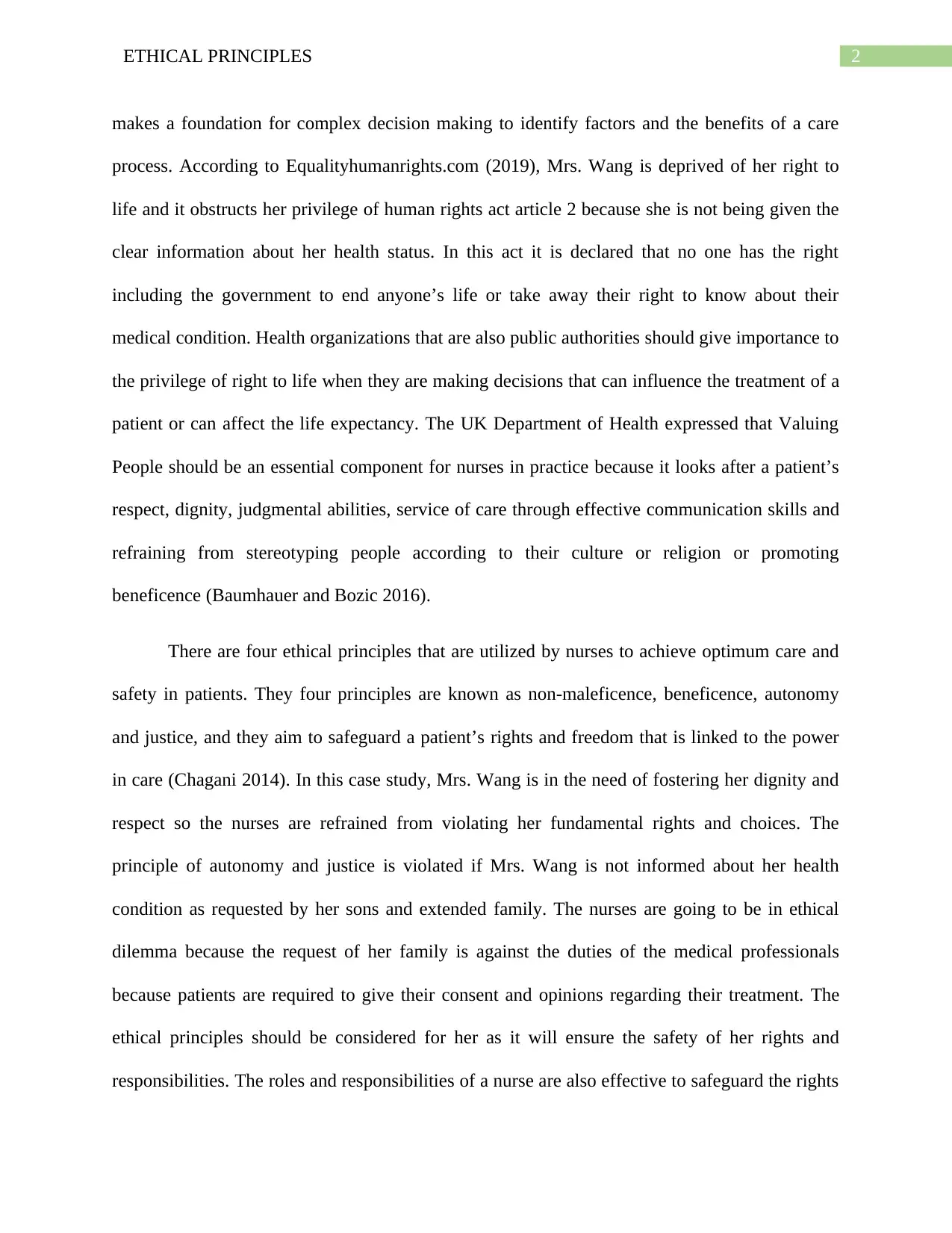
2ETHICAL PRINCIPLES
makes a foundation for complex decision making to identify factors and the benefits of a care
process. According to Equalityhumanrights.com (2019), Mrs. Wang is deprived of her right to
life and it obstructs her privilege of human rights act article 2 because she is not being given the
clear information about her health status. In this act it is declared that no one has the right
including the government to end anyone’s life or take away their right to know about their
medical condition. Health organizations that are also public authorities should give importance to
the privilege of right to life when they are making decisions that can influence the treatment of a
patient or can affect the life expectancy. The UK Department of Health expressed that Valuing
People should be an essential component for nurses in practice because it looks after a patient’s
respect, dignity, judgmental abilities, service of care through effective communication skills and
refraining from stereotyping people according to their culture or religion or promoting
beneficence (Baumhauer and Bozic 2016).
There are four ethical principles that are utilized by nurses to achieve optimum care and
safety in patients. They four principles are known as non-maleficence, beneficence, autonomy
and justice, and they aim to safeguard a patient’s rights and freedom that is linked to the power
in care (Chagani 2014). In this case study, Mrs. Wang is in the need of fostering her dignity and
respect so the nurses are refrained from violating her fundamental rights and choices. The
principle of autonomy and justice is violated if Mrs. Wang is not informed about her health
condition as requested by her sons and extended family. The nurses are going to be in ethical
dilemma because the request of her family is against the duties of the medical professionals
because patients are required to give their consent and opinions regarding their treatment. The
ethical principles should be considered for her as it will ensure the safety of her rights and
responsibilities. The roles and responsibilities of a nurse are also effective to safeguard the rights
makes a foundation for complex decision making to identify factors and the benefits of a care
process. According to Equalityhumanrights.com (2019), Mrs. Wang is deprived of her right to
life and it obstructs her privilege of human rights act article 2 because she is not being given the
clear information about her health status. In this act it is declared that no one has the right
including the government to end anyone’s life or take away their right to know about their
medical condition. Health organizations that are also public authorities should give importance to
the privilege of right to life when they are making decisions that can influence the treatment of a
patient or can affect the life expectancy. The UK Department of Health expressed that Valuing
People should be an essential component for nurses in practice because it looks after a patient’s
respect, dignity, judgmental abilities, service of care through effective communication skills and
refraining from stereotyping people according to their culture or religion or promoting
beneficence (Baumhauer and Bozic 2016).
There are four ethical principles that are utilized by nurses to achieve optimum care and
safety in patients. They four principles are known as non-maleficence, beneficence, autonomy
and justice, and they aim to safeguard a patient’s rights and freedom that is linked to the power
in care (Chagani 2014). In this case study, Mrs. Wang is in the need of fostering her dignity and
respect so the nurses are refrained from violating her fundamental rights and choices. The
principle of autonomy and justice is violated if Mrs. Wang is not informed about her health
condition as requested by her sons and extended family. The nurses are going to be in ethical
dilemma because the request of her family is against the duties of the medical professionals
because patients are required to give their consent and opinions regarding their treatment. The
ethical principles should be considered for her as it will ensure the safety of her rights and
responsibilities. The roles and responsibilities of a nurse are also effective to safeguard the rights
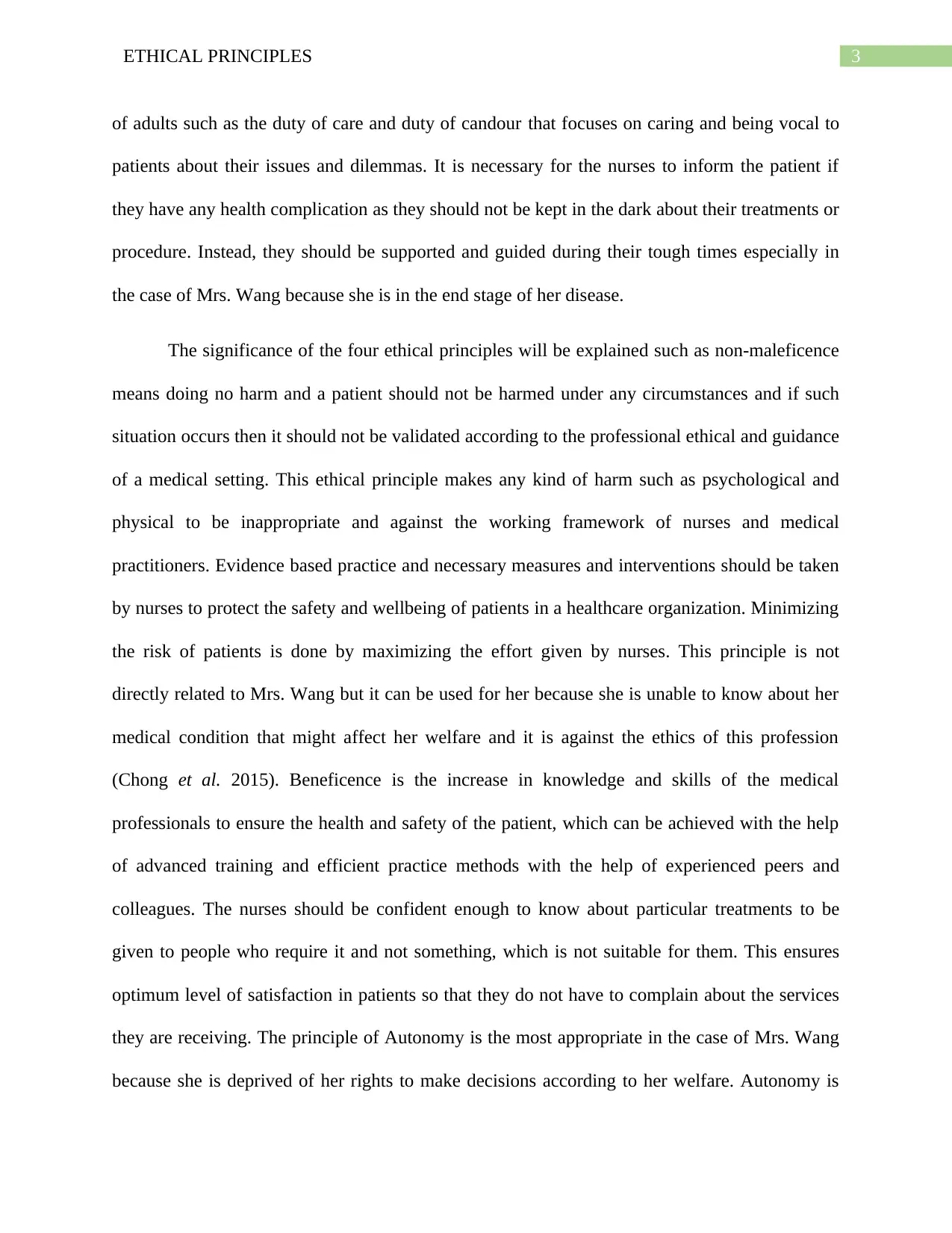
3ETHICAL PRINCIPLES
of adults such as the duty of care and duty of candour that focuses on caring and being vocal to
patients about their issues and dilemmas. It is necessary for the nurses to inform the patient if
they have any health complication as they should not be kept in the dark about their treatments or
procedure. Instead, they should be supported and guided during their tough times especially in
the case of Mrs. Wang because she is in the end stage of her disease.
The significance of the four ethical principles will be explained such as non-maleficence
means doing no harm and a patient should not be harmed under any circumstances and if such
situation occurs then it should not be validated according to the professional ethical and guidance
of a medical setting. This ethical principle makes any kind of harm such as psychological and
physical to be inappropriate and against the working framework of nurses and medical
practitioners. Evidence based practice and necessary measures and interventions should be taken
by nurses to protect the safety and wellbeing of patients in a healthcare organization. Minimizing
the risk of patients is done by maximizing the effort given by nurses. This principle is not
directly related to Mrs. Wang but it can be used for her because she is unable to know about her
medical condition that might affect her welfare and it is against the ethics of this profession
(Chong et al. 2015). Beneficence is the increase in knowledge and skills of the medical
professionals to ensure the health and safety of the patient, which can be achieved with the help
of advanced training and efficient practice methods with the help of experienced peers and
colleagues. The nurses should be confident enough to know about particular treatments to be
given to people who require it and not something, which is not suitable for them. This ensures
optimum level of satisfaction in patients so that they do not have to complain about the services
they are receiving. The principle of Autonomy is the most appropriate in the case of Mrs. Wang
because she is deprived of her rights to make decisions according to her welfare. Autonomy is
of adults such as the duty of care and duty of candour that focuses on caring and being vocal to
patients about their issues and dilemmas. It is necessary for the nurses to inform the patient if
they have any health complication as they should not be kept in the dark about their treatments or
procedure. Instead, they should be supported and guided during their tough times especially in
the case of Mrs. Wang because she is in the end stage of her disease.
The significance of the four ethical principles will be explained such as non-maleficence
means doing no harm and a patient should not be harmed under any circumstances and if such
situation occurs then it should not be validated according to the professional ethical and guidance
of a medical setting. This ethical principle makes any kind of harm such as psychological and
physical to be inappropriate and against the working framework of nurses and medical
practitioners. Evidence based practice and necessary measures and interventions should be taken
by nurses to protect the safety and wellbeing of patients in a healthcare organization. Minimizing
the risk of patients is done by maximizing the effort given by nurses. This principle is not
directly related to Mrs. Wang but it can be used for her because she is unable to know about her
medical condition that might affect her welfare and it is against the ethics of this profession
(Chong et al. 2015). Beneficence is the increase in knowledge and skills of the medical
professionals to ensure the health and safety of the patient, which can be achieved with the help
of advanced training and efficient practice methods with the help of experienced peers and
colleagues. The nurses should be confident enough to know about particular treatments to be
given to people who require it and not something, which is not suitable for them. This ensures
optimum level of satisfaction in patients so that they do not have to complain about the services
they are receiving. The principle of Autonomy is the most appropriate in the case of Mrs. Wang
because she is deprived of her rights to make decisions according to her welfare. Autonomy is
Secure Best Marks with AI Grader
Need help grading? Try our AI Grader for instant feedback on your assignments.
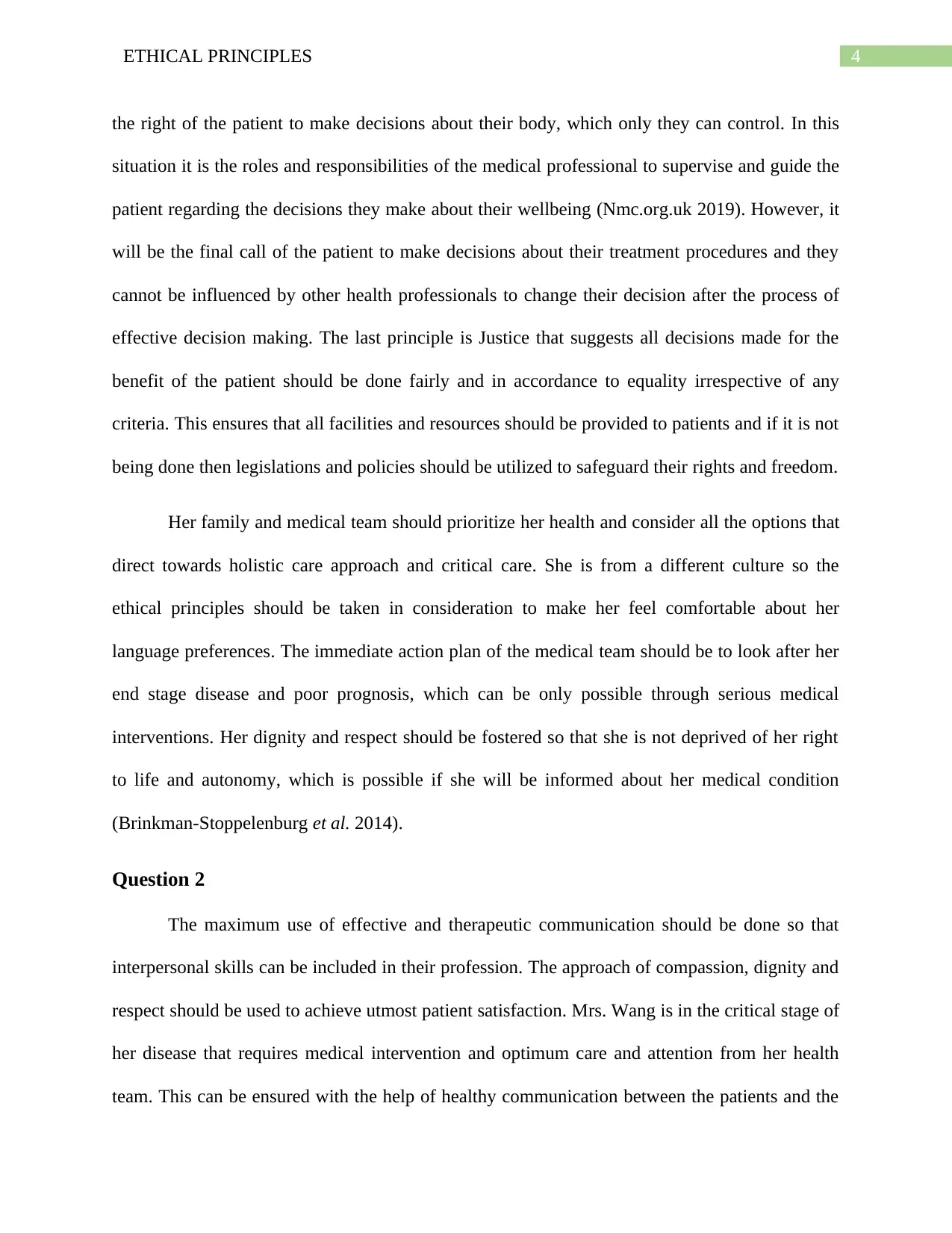
4ETHICAL PRINCIPLES
the right of the patient to make decisions about their body, which only they can control. In this
situation it is the roles and responsibilities of the medical professional to supervise and guide the
patient regarding the decisions they make about their wellbeing (Nmc.org.uk 2019). However, it
will be the final call of the patient to make decisions about their treatment procedures and they
cannot be influenced by other health professionals to change their decision after the process of
effective decision making. The last principle is Justice that suggests all decisions made for the
benefit of the patient should be done fairly and in accordance to equality irrespective of any
criteria. This ensures that all facilities and resources should be provided to patients and if it is not
being done then legislations and policies should be utilized to safeguard their rights and freedom.
Her family and medical team should prioritize her health and consider all the options that
direct towards holistic care approach and critical care. She is from a different culture so the
ethical principles should be taken in consideration to make her feel comfortable about her
language preferences. The immediate action plan of the medical team should be to look after her
end stage disease and poor prognosis, which can be only possible through serious medical
interventions. Her dignity and respect should be fostered so that she is not deprived of her right
to life and autonomy, which is possible if she will be informed about her medical condition
(Brinkman-Stoppelenburg et al. 2014).
Question 2
The maximum use of effective and therapeutic communication should be done so that
interpersonal skills can be included in their profession. The approach of compassion, dignity and
respect should be used to achieve utmost patient satisfaction. Mrs. Wang is in the critical stage of
her disease that requires medical intervention and optimum care and attention from her health
team. This can be ensured with the help of healthy communication between the patients and the
the right of the patient to make decisions about their body, which only they can control. In this
situation it is the roles and responsibilities of the medical professional to supervise and guide the
patient regarding the decisions they make about their wellbeing (Nmc.org.uk 2019). However, it
will be the final call of the patient to make decisions about their treatment procedures and they
cannot be influenced by other health professionals to change their decision after the process of
effective decision making. The last principle is Justice that suggests all decisions made for the
benefit of the patient should be done fairly and in accordance to equality irrespective of any
criteria. This ensures that all facilities and resources should be provided to patients and if it is not
being done then legislations and policies should be utilized to safeguard their rights and freedom.
Her family and medical team should prioritize her health and consider all the options that
direct towards holistic care approach and critical care. She is from a different culture so the
ethical principles should be taken in consideration to make her feel comfortable about her
language preferences. The immediate action plan of the medical team should be to look after her
end stage disease and poor prognosis, which can be only possible through serious medical
interventions. Her dignity and respect should be fostered so that she is not deprived of her right
to life and autonomy, which is possible if she will be informed about her medical condition
(Brinkman-Stoppelenburg et al. 2014).
Question 2
The maximum use of effective and therapeutic communication should be done so that
interpersonal skills can be included in their profession. The approach of compassion, dignity and
respect should be used to achieve utmost patient satisfaction. Mrs. Wang is in the critical stage of
her disease that requires medical intervention and optimum care and attention from her health
team. This can be ensured with the help of healthy communication between the patients and the
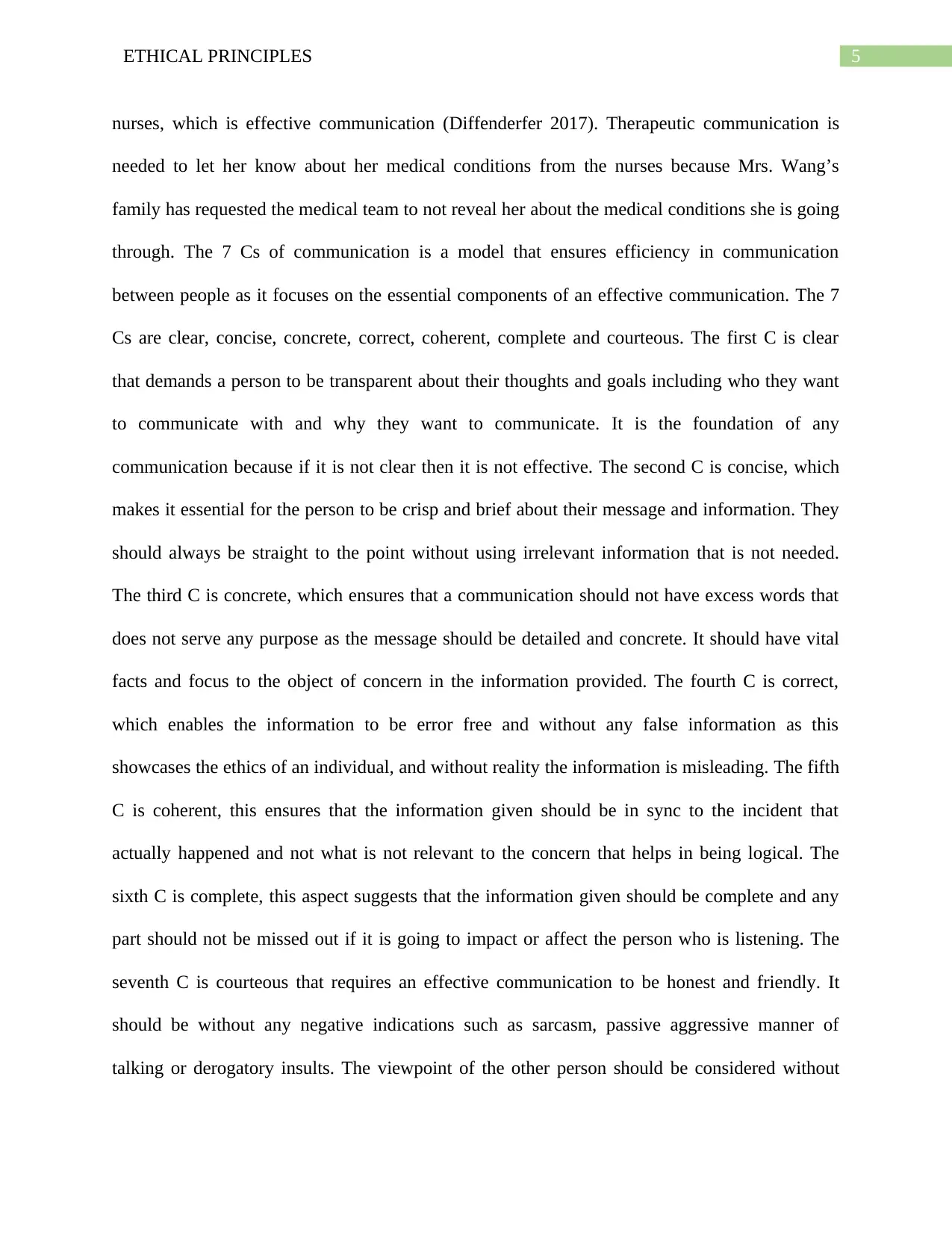
5ETHICAL PRINCIPLES
nurses, which is effective communication (Diffenderfer 2017). Therapeutic communication is
needed to let her know about her medical conditions from the nurses because Mrs. Wang’s
family has requested the medical team to not reveal her about the medical conditions she is going
through. The 7 Cs of communication is a model that ensures efficiency in communication
between people as it focuses on the essential components of an effective communication. The 7
Cs are clear, concise, concrete, correct, coherent, complete and courteous. The first C is clear
that demands a person to be transparent about their thoughts and goals including who they want
to communicate with and why they want to communicate. It is the foundation of any
communication because if it is not clear then it is not effective. The second C is concise, which
makes it essential for the person to be crisp and brief about their message and information. They
should always be straight to the point without using irrelevant information that is not needed.
The third C is concrete, which ensures that a communication should not have excess words that
does not serve any purpose as the message should be detailed and concrete. It should have vital
facts and focus to the object of concern in the information provided. The fourth C is correct,
which enables the information to be error free and without any false information as this
showcases the ethics of an individual, and without reality the information is misleading. The fifth
C is coherent, this ensures that the information given should be in sync to the incident that
actually happened and not what is not relevant to the concern that helps in being logical. The
sixth C is complete, this aspect suggests that the information given should be complete and any
part should not be missed out if it is going to impact or affect the person who is listening. The
seventh C is courteous that requires an effective communication to be honest and friendly. It
should be without any negative indications such as sarcasm, passive aggressive manner of
talking or derogatory insults. The viewpoint of the other person should be considered without
nurses, which is effective communication (Diffenderfer 2017). Therapeutic communication is
needed to let her know about her medical conditions from the nurses because Mrs. Wang’s
family has requested the medical team to not reveal her about the medical conditions she is going
through. The 7 Cs of communication is a model that ensures efficiency in communication
between people as it focuses on the essential components of an effective communication. The 7
Cs are clear, concise, concrete, correct, coherent, complete and courteous. The first C is clear
that demands a person to be transparent about their thoughts and goals including who they want
to communicate with and why they want to communicate. It is the foundation of any
communication because if it is not clear then it is not effective. The second C is concise, which
makes it essential for the person to be crisp and brief about their message and information. They
should always be straight to the point without using irrelevant information that is not needed.
The third C is concrete, which ensures that a communication should not have excess words that
does not serve any purpose as the message should be detailed and concrete. It should have vital
facts and focus to the object of concern in the information provided. The fourth C is correct,
which enables the information to be error free and without any false information as this
showcases the ethics of an individual, and without reality the information is misleading. The fifth
C is coherent, this ensures that the information given should be in sync to the incident that
actually happened and not what is not relevant to the concern that helps in being logical. The
sixth C is complete, this aspect suggests that the information given should be complete and any
part should not be missed out if it is going to impact or affect the person who is listening. The
seventh C is courteous that requires an effective communication to be honest and friendly. It
should be without any negative indications such as sarcasm, passive aggressive manner of
talking or derogatory insults. The viewpoint of the other person should be considered without
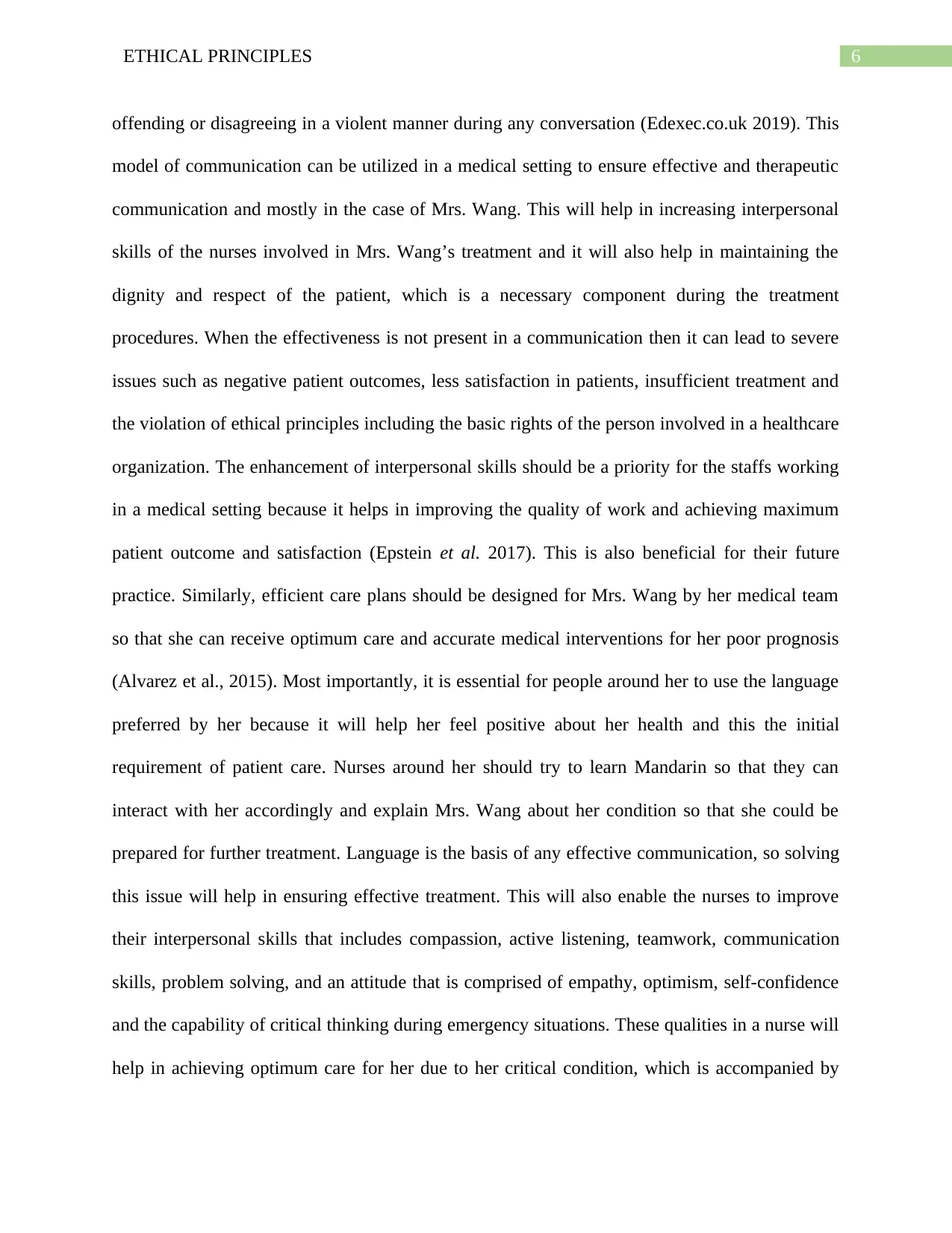
6ETHICAL PRINCIPLES
offending or disagreeing in a violent manner during any conversation (Edexec.co.uk 2019). This
model of communication can be utilized in a medical setting to ensure effective and therapeutic
communication and mostly in the case of Mrs. Wang. This will help in increasing interpersonal
skills of the nurses involved in Mrs. Wang’s treatment and it will also help in maintaining the
dignity and respect of the patient, which is a necessary component during the treatment
procedures. When the effectiveness is not present in a communication then it can lead to severe
issues such as negative patient outcomes, less satisfaction in patients, insufficient treatment and
the violation of ethical principles including the basic rights of the person involved in a healthcare
organization. The enhancement of interpersonal skills should be a priority for the staffs working
in a medical setting because it helps in improving the quality of work and achieving maximum
patient outcome and satisfaction (Epstein et al. 2017). This is also beneficial for their future
practice. Similarly, efficient care plans should be designed for Mrs. Wang by her medical team
so that she can receive optimum care and accurate medical interventions for her poor prognosis
(Alvarez et al., 2015). Most importantly, it is essential for people around her to use the language
preferred by her because it will help her feel positive about her health and this the initial
requirement of patient care. Nurses around her should try to learn Mandarin so that they can
interact with her accordingly and explain Mrs. Wang about her condition so that she could be
prepared for further treatment. Language is the basis of any effective communication, so solving
this issue will help in ensuring effective treatment. This will also enable the nurses to improve
their interpersonal skills that includes compassion, active listening, teamwork, communication
skills, problem solving, and an attitude that is comprised of empathy, optimism, self-confidence
and the capability of critical thinking during emergency situations. These qualities in a nurse will
help in achieving optimum care for her due to her critical condition, which is accompanied by
offending or disagreeing in a violent manner during any conversation (Edexec.co.uk 2019). This
model of communication can be utilized in a medical setting to ensure effective and therapeutic
communication and mostly in the case of Mrs. Wang. This will help in increasing interpersonal
skills of the nurses involved in Mrs. Wang’s treatment and it will also help in maintaining the
dignity and respect of the patient, which is a necessary component during the treatment
procedures. When the effectiveness is not present in a communication then it can lead to severe
issues such as negative patient outcomes, less satisfaction in patients, insufficient treatment and
the violation of ethical principles including the basic rights of the person involved in a healthcare
organization. The enhancement of interpersonal skills should be a priority for the staffs working
in a medical setting because it helps in improving the quality of work and achieving maximum
patient outcome and satisfaction (Epstein et al. 2017). This is also beneficial for their future
practice. Similarly, efficient care plans should be designed for Mrs. Wang by her medical team
so that she can receive optimum care and accurate medical interventions for her poor prognosis
(Alvarez et al., 2015). Most importantly, it is essential for people around her to use the language
preferred by her because it will help her feel positive about her health and this the initial
requirement of patient care. Nurses around her should try to learn Mandarin so that they can
interact with her accordingly and explain Mrs. Wang about her condition so that she could be
prepared for further treatment. Language is the basis of any effective communication, so solving
this issue will help in ensuring effective treatment. This will also enable the nurses to improve
their interpersonal skills that includes compassion, active listening, teamwork, communication
skills, problem solving, and an attitude that is comprised of empathy, optimism, self-confidence
and the capability of critical thinking during emergency situations. These qualities in a nurse will
help in achieving optimum care for her due to her critical condition, which is accompanied by
Paraphrase This Document
Need a fresh take? Get an instant paraphrase of this document with our AI Paraphraser
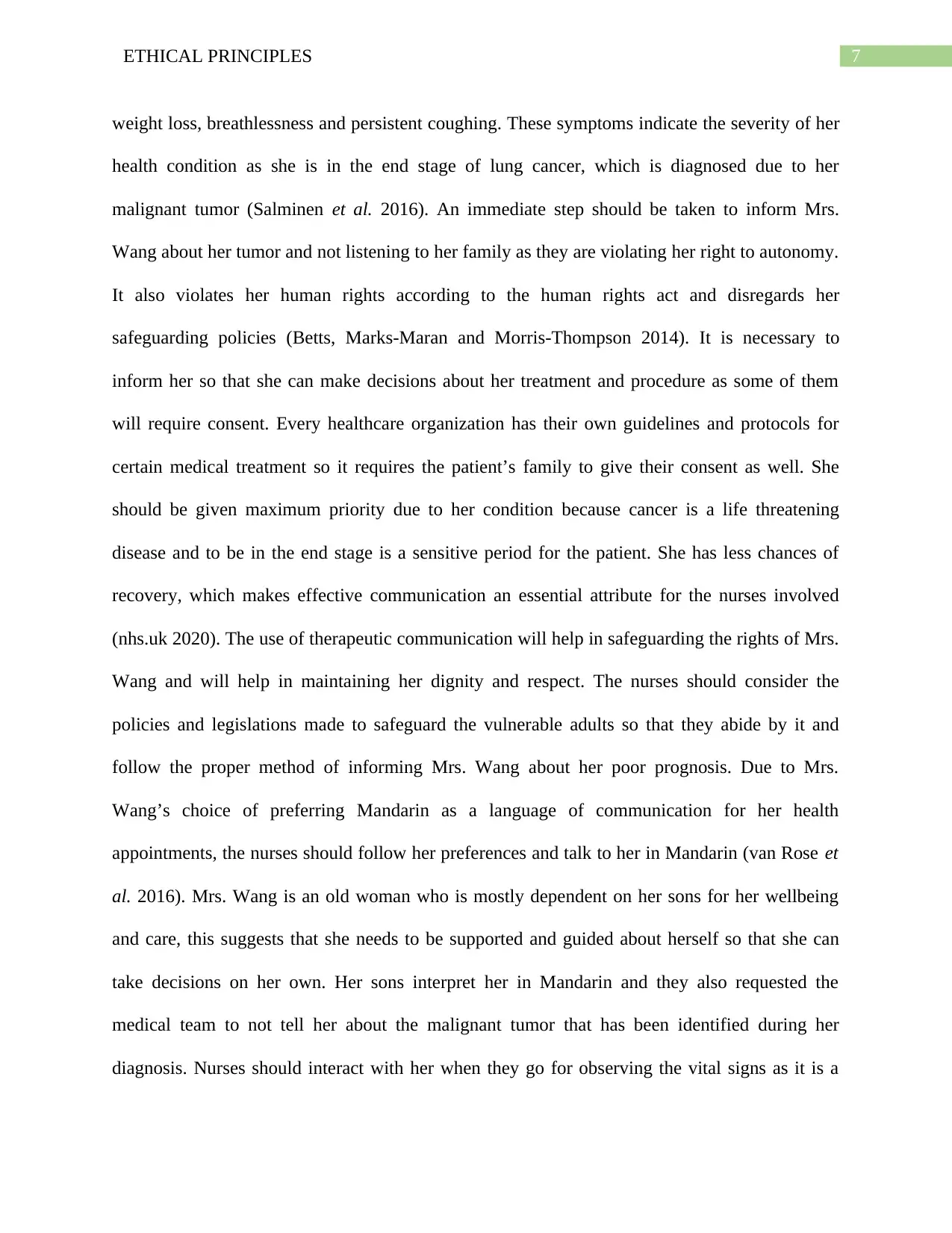
7ETHICAL PRINCIPLES
weight loss, breathlessness and persistent coughing. These symptoms indicate the severity of her
health condition as she is in the end stage of lung cancer, which is diagnosed due to her
malignant tumor (Salminen et al. 2016). An immediate step should be taken to inform Mrs.
Wang about her tumor and not listening to her family as they are violating her right to autonomy.
It also violates her human rights according to the human rights act and disregards her
safeguarding policies (Betts, Marks-Maran and Morris-Thompson 2014). It is necessary to
inform her so that she can make decisions about her treatment and procedure as some of them
will require consent. Every healthcare organization has their own guidelines and protocols for
certain medical treatment so it requires the patient’s family to give their consent as well. She
should be given maximum priority due to her condition because cancer is a life threatening
disease and to be in the end stage is a sensitive period for the patient. She has less chances of
recovery, which makes effective communication an essential attribute for the nurses involved
(nhs.uk 2020). The use of therapeutic communication will help in safeguarding the rights of Mrs.
Wang and will help in maintaining her dignity and respect. The nurses should consider the
policies and legislations made to safeguard the vulnerable adults so that they abide by it and
follow the proper method of informing Mrs. Wang about her poor prognosis. Due to Mrs.
Wang’s choice of preferring Mandarin as a language of communication for her health
appointments, the nurses should follow her preferences and talk to her in Mandarin (van Rose et
al. 2016). Mrs. Wang is an old woman who is mostly dependent on her sons for her wellbeing
and care, this suggests that she needs to be supported and guided about herself so that she can
take decisions on her own. Her sons interpret her in Mandarin and they also requested the
medical team to not tell her about the malignant tumor that has been identified during her
diagnosis. Nurses should interact with her when they go for observing the vital signs as it is a
weight loss, breathlessness and persistent coughing. These symptoms indicate the severity of her
health condition as she is in the end stage of lung cancer, which is diagnosed due to her
malignant tumor (Salminen et al. 2016). An immediate step should be taken to inform Mrs.
Wang about her tumor and not listening to her family as they are violating her right to autonomy.
It also violates her human rights according to the human rights act and disregards her
safeguarding policies (Betts, Marks-Maran and Morris-Thompson 2014). It is necessary to
inform her so that she can make decisions about her treatment and procedure as some of them
will require consent. Every healthcare organization has their own guidelines and protocols for
certain medical treatment so it requires the patient’s family to give their consent as well. She
should be given maximum priority due to her condition because cancer is a life threatening
disease and to be in the end stage is a sensitive period for the patient. She has less chances of
recovery, which makes effective communication an essential attribute for the nurses involved
(nhs.uk 2020). The use of therapeutic communication will help in safeguarding the rights of Mrs.
Wang and will help in maintaining her dignity and respect. The nurses should consider the
policies and legislations made to safeguard the vulnerable adults so that they abide by it and
follow the proper method of informing Mrs. Wang about her poor prognosis. Due to Mrs.
Wang’s choice of preferring Mandarin as a language of communication for her health
appointments, the nurses should follow her preferences and talk to her in Mandarin (van Rose et
al. 2016). Mrs. Wang is an old woman who is mostly dependent on her sons for her wellbeing
and care, this suggests that she needs to be supported and guided about herself so that she can
take decisions on her own. Her sons interpret her in Mandarin and they also requested the
medical team to not tell her about the malignant tumor that has been identified during her
diagnosis. Nurses should interact with her when they go for observing the vital signs as it is a
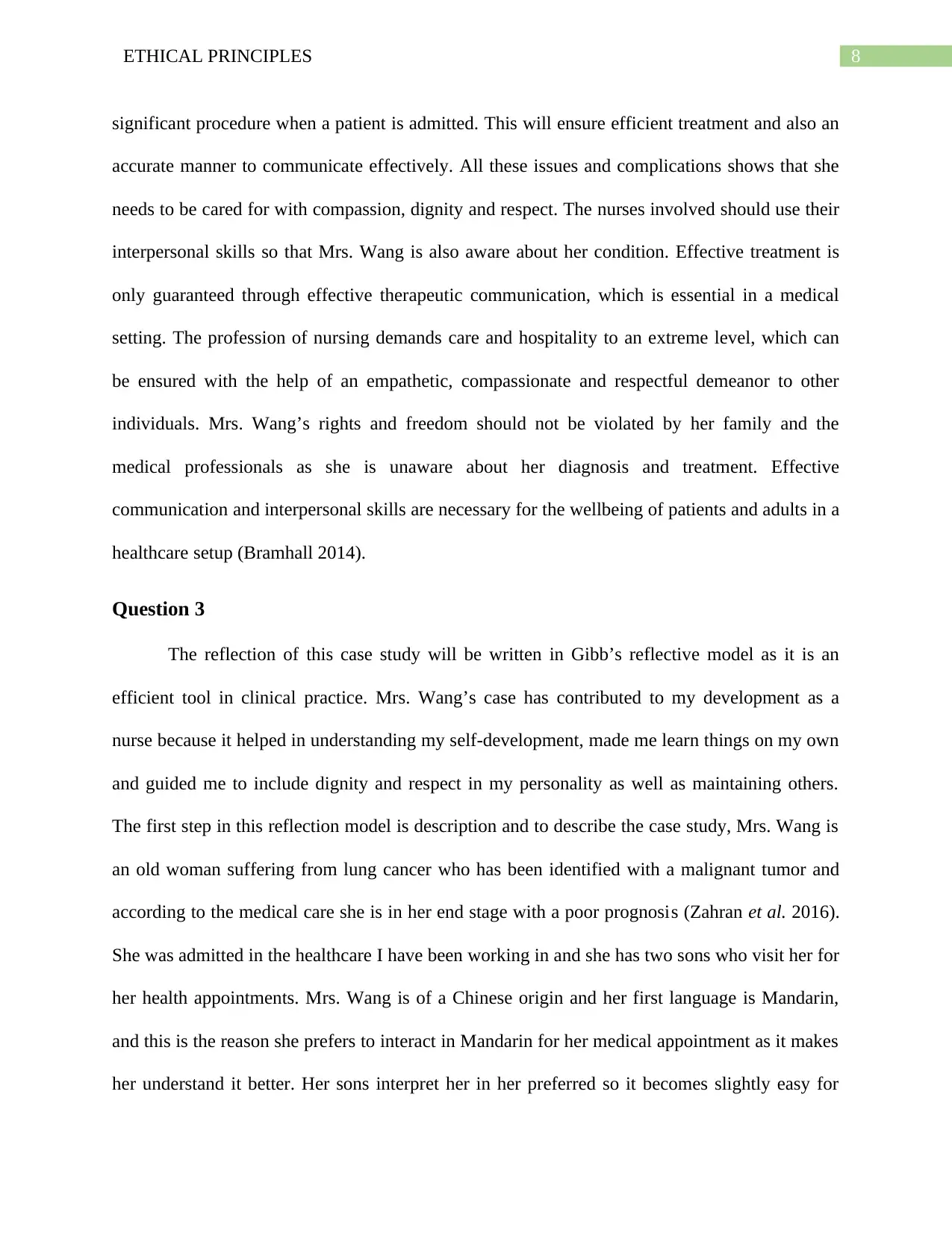
8ETHICAL PRINCIPLES
significant procedure when a patient is admitted. This will ensure efficient treatment and also an
accurate manner to communicate effectively. All these issues and complications shows that she
needs to be cared for with compassion, dignity and respect. The nurses involved should use their
interpersonal skills so that Mrs. Wang is also aware about her condition. Effective treatment is
only guaranteed through effective therapeutic communication, which is essential in a medical
setting. The profession of nursing demands care and hospitality to an extreme level, which can
be ensured with the help of an empathetic, compassionate and respectful demeanor to other
individuals. Mrs. Wang’s rights and freedom should not be violated by her family and the
medical professionals as she is unaware about her diagnosis and treatment. Effective
communication and interpersonal skills are necessary for the wellbeing of patients and adults in a
healthcare setup (Bramhall 2014).
Question 3
The reflection of this case study will be written in Gibb’s reflective model as it is an
efficient tool in clinical practice. Mrs. Wang’s case has contributed to my development as a
nurse because it helped in understanding my self-development, made me learn things on my own
and guided me to include dignity and respect in my personality as well as maintaining others.
The first step in this reflection model is description and to describe the case study, Mrs. Wang is
an old woman suffering from lung cancer who has been identified with a malignant tumor and
according to the medical care she is in her end stage with a poor prognosis (Zahran et al. 2016).
She was admitted in the healthcare I have been working in and she has two sons who visit her for
her health appointments. Mrs. Wang is of a Chinese origin and her first language is Mandarin,
and this is the reason she prefers to interact in Mandarin for her medical appointment as it makes
her understand it better. Her sons interpret her in her preferred so it becomes slightly easy for
significant procedure when a patient is admitted. This will ensure efficient treatment and also an
accurate manner to communicate effectively. All these issues and complications shows that she
needs to be cared for with compassion, dignity and respect. The nurses involved should use their
interpersonal skills so that Mrs. Wang is also aware about her condition. Effective treatment is
only guaranteed through effective therapeutic communication, which is essential in a medical
setting. The profession of nursing demands care and hospitality to an extreme level, which can
be ensured with the help of an empathetic, compassionate and respectful demeanor to other
individuals. Mrs. Wang’s rights and freedom should not be violated by her family and the
medical professionals as she is unaware about her diagnosis and treatment. Effective
communication and interpersonal skills are necessary for the wellbeing of patients and adults in a
healthcare setup (Bramhall 2014).
Question 3
The reflection of this case study will be written in Gibb’s reflective model as it is an
efficient tool in clinical practice. Mrs. Wang’s case has contributed to my development as a
nurse because it helped in understanding my self-development, made me learn things on my own
and guided me to include dignity and respect in my personality as well as maintaining others.
The first step in this reflection model is description and to describe the case study, Mrs. Wang is
an old woman suffering from lung cancer who has been identified with a malignant tumor and
according to the medical care she is in her end stage with a poor prognosis (Zahran et al. 2016).
She was admitted in the healthcare I have been working in and she has two sons who visit her for
her health appointments. Mrs. Wang is of a Chinese origin and her first language is Mandarin,
and this is the reason she prefers to interact in Mandarin for her medical appointment as it makes
her understand it better. Her sons interpret her in her preferred so it becomes slightly easy for
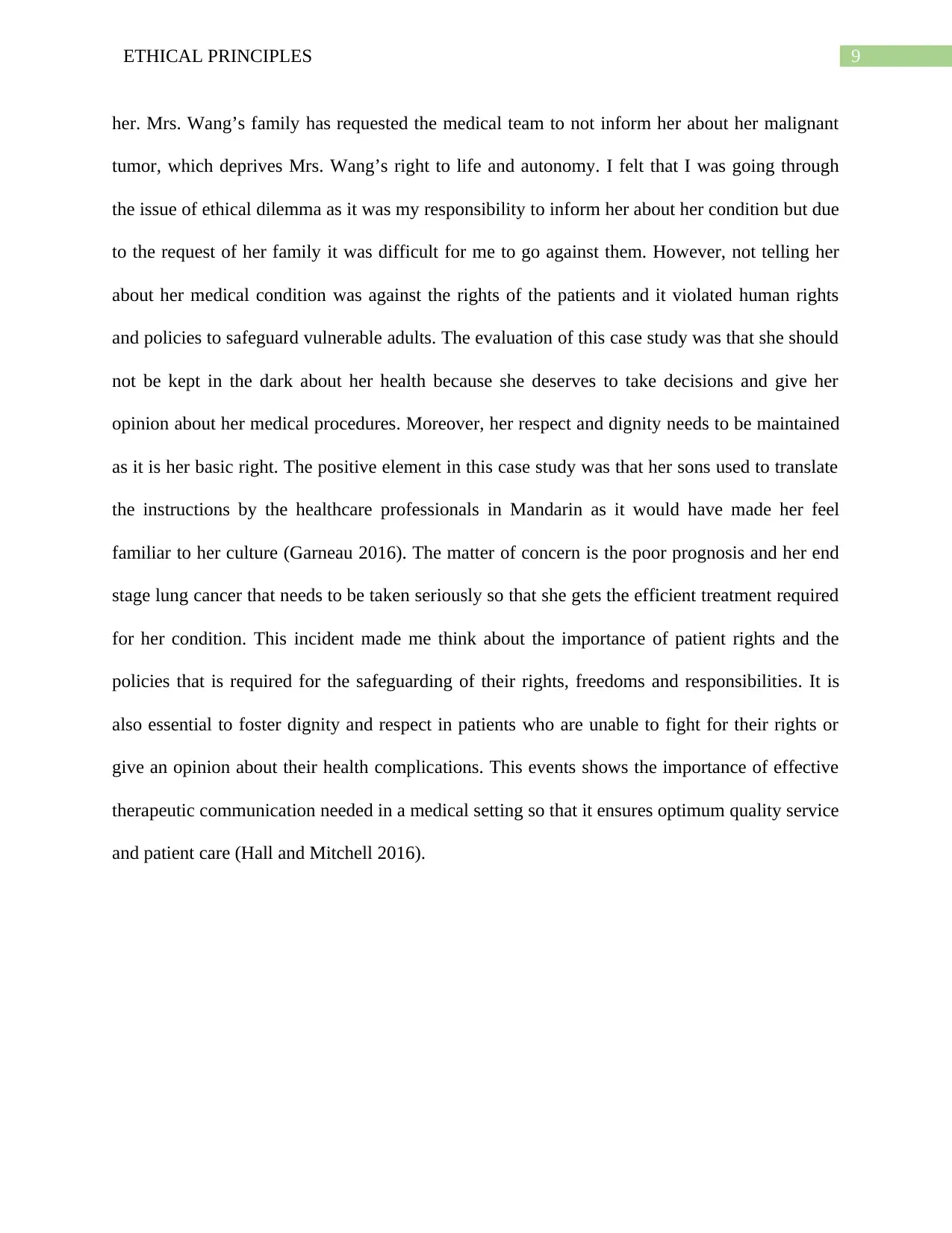
9ETHICAL PRINCIPLES
her. Mrs. Wang’s family has requested the medical team to not inform her about her malignant
tumor, which deprives Mrs. Wang’s right to life and autonomy. I felt that I was going through
the issue of ethical dilemma as it was my responsibility to inform her about her condition but due
to the request of her family it was difficult for me to go against them. However, not telling her
about her medical condition was against the rights of the patients and it violated human rights
and policies to safeguard vulnerable adults. The evaluation of this case study was that she should
not be kept in the dark about her health because she deserves to take decisions and give her
opinion about her medical procedures. Moreover, her respect and dignity needs to be maintained
as it is her basic right. The positive element in this case study was that her sons used to translate
the instructions by the healthcare professionals in Mandarin as it would have made her feel
familiar to her culture (Garneau 2016). The matter of concern is the poor prognosis and her end
stage lung cancer that needs to be taken seriously so that she gets the efficient treatment required
for her condition. This incident made me think about the importance of patient rights and the
policies that is required for the safeguarding of their rights, freedoms and responsibilities. It is
also essential to foster dignity and respect in patients who are unable to fight for their rights or
give an opinion about their health complications. This events shows the importance of effective
therapeutic communication needed in a medical setting so that it ensures optimum quality service
and patient care (Hall and Mitchell 2016).
her. Mrs. Wang’s family has requested the medical team to not inform her about her malignant
tumor, which deprives Mrs. Wang’s right to life and autonomy. I felt that I was going through
the issue of ethical dilemma as it was my responsibility to inform her about her condition but due
to the request of her family it was difficult for me to go against them. However, not telling her
about her medical condition was against the rights of the patients and it violated human rights
and policies to safeguard vulnerable adults. The evaluation of this case study was that she should
not be kept in the dark about her health because she deserves to take decisions and give her
opinion about her medical procedures. Moreover, her respect and dignity needs to be maintained
as it is her basic right. The positive element in this case study was that her sons used to translate
the instructions by the healthcare professionals in Mandarin as it would have made her feel
familiar to her culture (Garneau 2016). The matter of concern is the poor prognosis and her end
stage lung cancer that needs to be taken seriously so that she gets the efficient treatment required
for her condition. This incident made me think about the importance of patient rights and the
policies that is required for the safeguarding of their rights, freedoms and responsibilities. It is
also essential to foster dignity and respect in patients who are unable to fight for their rights or
give an opinion about their health complications. This events shows the importance of effective
therapeutic communication needed in a medical setting so that it ensures optimum quality service
and patient care (Hall and Mitchell 2016).
Secure Best Marks with AI Grader
Need help grading? Try our AI Grader for instant feedback on your assignments.
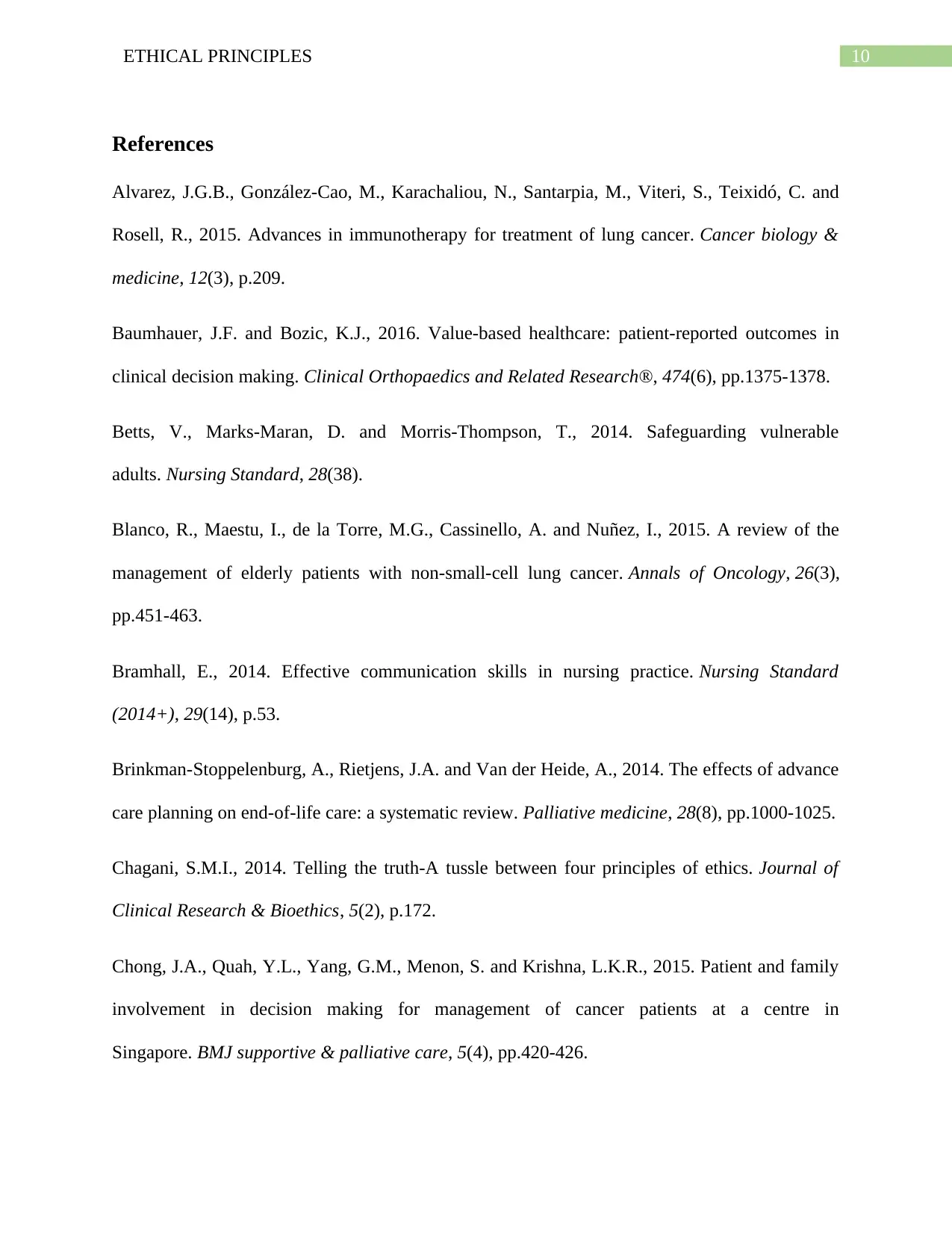
10ETHICAL PRINCIPLES
References
Alvarez, J.G.B., González-Cao, M., Karachaliou, N., Santarpia, M., Viteri, S., Teixidó, C. and
Rosell, R., 2015. Advances in immunotherapy for treatment of lung cancer. Cancer biology &
medicine, 12(3), p.209.
Baumhauer, J.F. and Bozic, K.J., 2016. Value-based healthcare: patient-reported outcomes in
clinical decision making. Clinical Orthopaedics and Related Research®, 474(6), pp.1375-1378.
Betts, V., Marks-Maran, D. and Morris-Thompson, T., 2014. Safeguarding vulnerable
adults. Nursing Standard, 28(38).
Blanco, R., Maestu, I., de la Torre, M.G., Cassinello, A. and Nuñez, I., 2015. A review of the
management of elderly patients with non-small-cell lung cancer. Annals of Oncology, 26(3),
pp.451-463.
Bramhall, E., 2014. Effective communication skills in nursing practice. Nursing Standard
(2014+), 29(14), p.53.
Brinkman-Stoppelenburg, A., Rietjens, J.A. and Van der Heide, A., 2014. The effects of advance
care planning on end-of-life care: a systematic review. Palliative medicine, 28(8), pp.1000-1025.
Chagani, S.M.I., 2014. Telling the truth-A tussle between four principles of ethics. Journal of
Clinical Research & Bioethics, 5(2), p.172.
Chong, J.A., Quah, Y.L., Yang, G.M., Menon, S. and Krishna, L.K.R., 2015. Patient and family
involvement in decision making for management of cancer patients at a centre in
Singapore. BMJ supportive & palliative care, 5(4), pp.420-426.
References
Alvarez, J.G.B., González-Cao, M., Karachaliou, N., Santarpia, M., Viteri, S., Teixidó, C. and
Rosell, R., 2015. Advances in immunotherapy for treatment of lung cancer. Cancer biology &
medicine, 12(3), p.209.
Baumhauer, J.F. and Bozic, K.J., 2016. Value-based healthcare: patient-reported outcomes in
clinical decision making. Clinical Orthopaedics and Related Research®, 474(6), pp.1375-1378.
Betts, V., Marks-Maran, D. and Morris-Thompson, T., 2014. Safeguarding vulnerable
adults. Nursing Standard, 28(38).
Blanco, R., Maestu, I., de la Torre, M.G., Cassinello, A. and Nuñez, I., 2015. A review of the
management of elderly patients with non-small-cell lung cancer. Annals of Oncology, 26(3),
pp.451-463.
Bramhall, E., 2014. Effective communication skills in nursing practice. Nursing Standard
(2014+), 29(14), p.53.
Brinkman-Stoppelenburg, A., Rietjens, J.A. and Van der Heide, A., 2014. The effects of advance
care planning on end-of-life care: a systematic review. Palliative medicine, 28(8), pp.1000-1025.
Chagani, S.M.I., 2014. Telling the truth-A tussle between four principles of ethics. Journal of
Clinical Research & Bioethics, 5(2), p.172.
Chong, J.A., Quah, Y.L., Yang, G.M., Menon, S. and Krishna, L.K.R., 2015. Patient and family
involvement in decision making for management of cancer patients at a centre in
Singapore. BMJ supportive & palliative care, 5(4), pp.420-426.
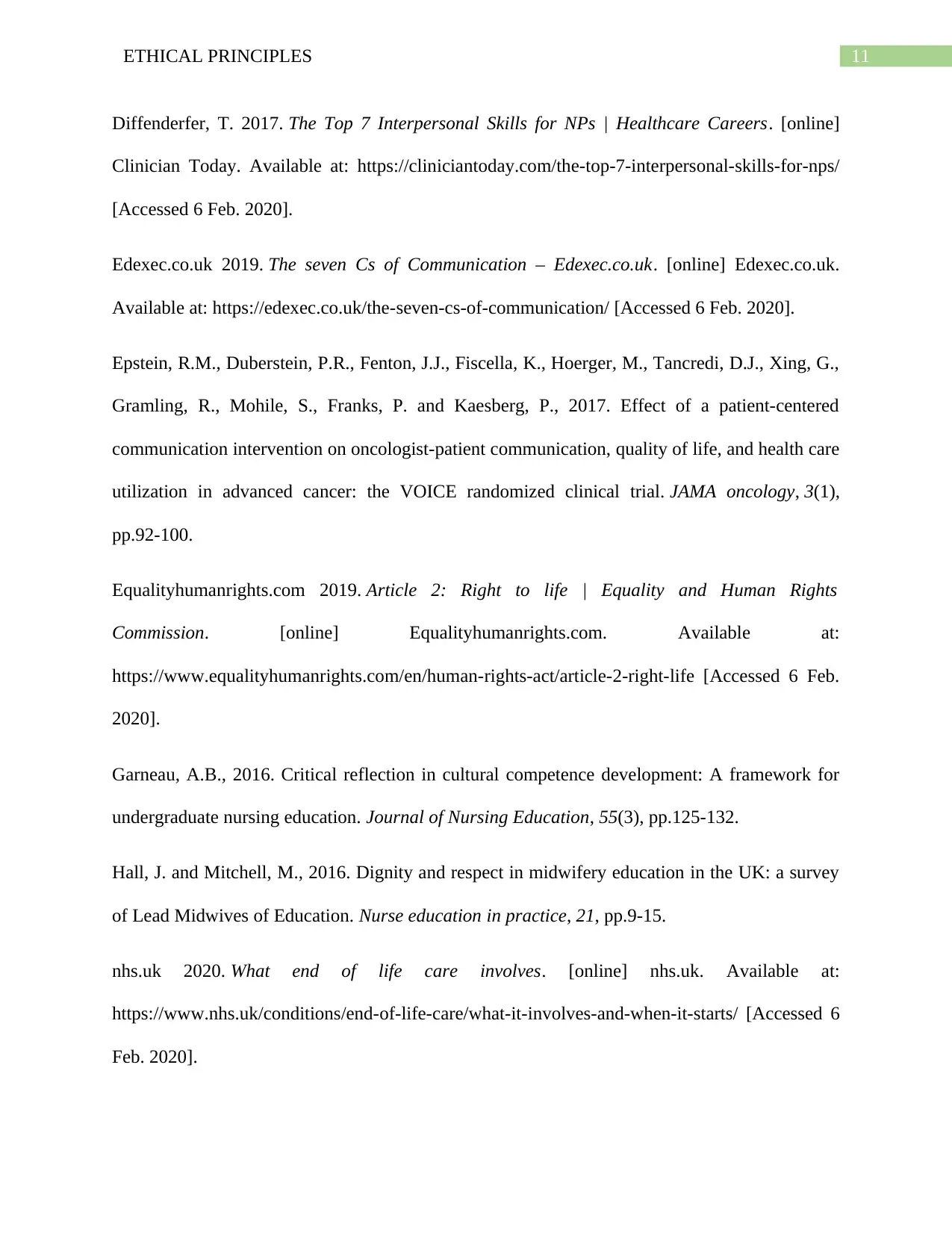
11ETHICAL PRINCIPLES
Diffenderfer, T. 2017. The Top 7 Interpersonal Skills for NPs | Healthcare Careers. [online]
Clinician Today. Available at: https://cliniciantoday.com/the-top-7-interpersonal-skills-for-nps/
[Accessed 6 Feb. 2020].
Edexec.co.uk 2019. The seven Cs of Communication – Edexec.co.uk. [online] Edexec.co.uk.
Available at: https://edexec.co.uk/the-seven-cs-of-communication/ [Accessed 6 Feb. 2020].
Epstein, R.M., Duberstein, P.R., Fenton, J.J., Fiscella, K., Hoerger, M., Tancredi, D.J., Xing, G.,
Gramling, R., Mohile, S., Franks, P. and Kaesberg, P., 2017. Effect of a patient-centered
communication intervention on oncologist-patient communication, quality of life, and health care
utilization in advanced cancer: the VOICE randomized clinical trial. JAMA oncology, 3(1),
pp.92-100.
Equalityhumanrights.com 2019. Article 2: Right to life | Equality and Human Rights
Commission. [online] Equalityhumanrights.com. Available at:
https://www.equalityhumanrights.com/en/human-rights-act/article-2-right-life [Accessed 6 Feb.
2020].
Garneau, A.B., 2016. Critical reflection in cultural competence development: A framework for
undergraduate nursing education. Journal of Nursing Education, 55(3), pp.125-132.
Hall, J. and Mitchell, M., 2016. Dignity and respect in midwifery education in the UK: a survey
of Lead Midwives of Education. Nurse education in practice, 21, pp.9-15.
nhs.uk 2020. What end of life care involves. [online] nhs.uk. Available at:
https://www.nhs.uk/conditions/end-of-life-care/what-it-involves-and-when-it-starts/ [Accessed 6
Feb. 2020].
Diffenderfer, T. 2017. The Top 7 Interpersonal Skills for NPs | Healthcare Careers. [online]
Clinician Today. Available at: https://cliniciantoday.com/the-top-7-interpersonal-skills-for-nps/
[Accessed 6 Feb. 2020].
Edexec.co.uk 2019. The seven Cs of Communication – Edexec.co.uk. [online] Edexec.co.uk.
Available at: https://edexec.co.uk/the-seven-cs-of-communication/ [Accessed 6 Feb. 2020].
Epstein, R.M., Duberstein, P.R., Fenton, J.J., Fiscella, K., Hoerger, M., Tancredi, D.J., Xing, G.,
Gramling, R., Mohile, S., Franks, P. and Kaesberg, P., 2017. Effect of a patient-centered
communication intervention on oncologist-patient communication, quality of life, and health care
utilization in advanced cancer: the VOICE randomized clinical trial. JAMA oncology, 3(1),
pp.92-100.
Equalityhumanrights.com 2019. Article 2: Right to life | Equality and Human Rights
Commission. [online] Equalityhumanrights.com. Available at:
https://www.equalityhumanrights.com/en/human-rights-act/article-2-right-life [Accessed 6 Feb.
2020].
Garneau, A.B., 2016. Critical reflection in cultural competence development: A framework for
undergraduate nursing education. Journal of Nursing Education, 55(3), pp.125-132.
Hall, J. and Mitchell, M., 2016. Dignity and respect in midwifery education in the UK: a survey
of Lead Midwives of Education. Nurse education in practice, 21, pp.9-15.
nhs.uk 2020. What end of life care involves. [online] nhs.uk. Available at:
https://www.nhs.uk/conditions/end-of-life-care/what-it-involves-and-when-it-starts/ [Accessed 6
Feb. 2020].
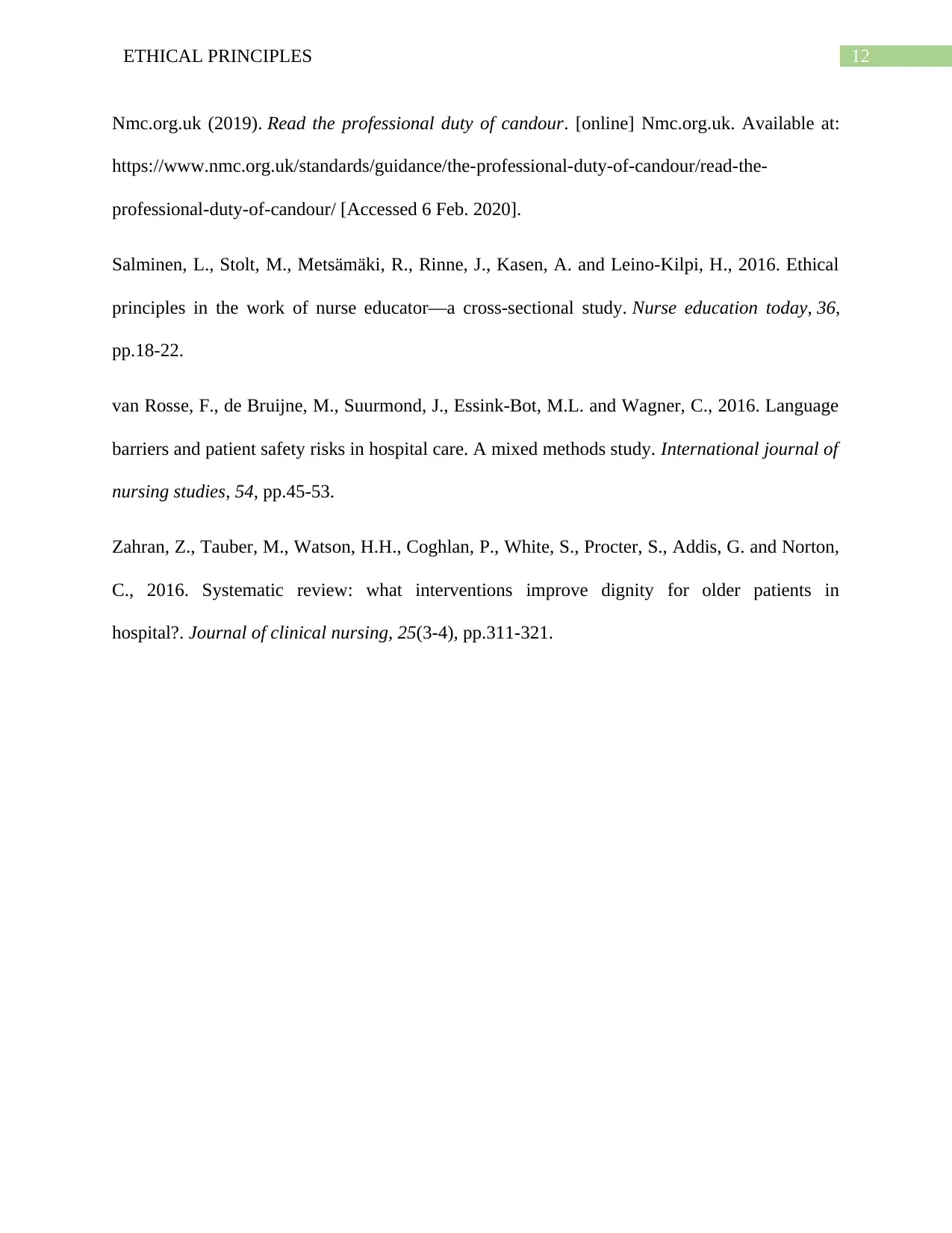
12ETHICAL PRINCIPLES
Nmc.org.uk (2019). Read the professional duty of candour. [online] Nmc.org.uk. Available at:
https://www.nmc.org.uk/standards/guidance/the-professional-duty-of-candour/read-the-
professional-duty-of-candour/ [Accessed 6 Feb. 2020].
Salminen, L., Stolt, M., Metsämäki, R., Rinne, J., Kasen, A. and Leino-Kilpi, H., 2016. Ethical
principles in the work of nurse educator—a cross-sectional study. Nurse education today, 36,
pp.18-22.
van Rosse, F., de Bruijne, M., Suurmond, J., Essink-Bot, M.L. and Wagner, C., 2016. Language
barriers and patient safety risks in hospital care. A mixed methods study. International journal of
nursing studies, 54, pp.45-53.
Zahran, Z., Tauber, M., Watson, H.H., Coghlan, P., White, S., Procter, S., Addis, G. and Norton,
C., 2016. Systematic review: what interventions improve dignity for older patients in
hospital?. Journal of clinical nursing, 25(3-4), pp.311-321.
Nmc.org.uk (2019). Read the professional duty of candour. [online] Nmc.org.uk. Available at:
https://www.nmc.org.uk/standards/guidance/the-professional-duty-of-candour/read-the-
professional-duty-of-candour/ [Accessed 6 Feb. 2020].
Salminen, L., Stolt, M., Metsämäki, R., Rinne, J., Kasen, A. and Leino-Kilpi, H., 2016. Ethical
principles in the work of nurse educator—a cross-sectional study. Nurse education today, 36,
pp.18-22.
van Rosse, F., de Bruijne, M., Suurmond, J., Essink-Bot, M.L. and Wagner, C., 2016. Language
barriers and patient safety risks in hospital care. A mixed methods study. International journal of
nursing studies, 54, pp.45-53.
Zahran, Z., Tauber, M., Watson, H.H., Coghlan, P., White, S., Procter, S., Addis, G. and Norton,
C., 2016. Systematic review: what interventions improve dignity for older patients in
hospital?. Journal of clinical nursing, 25(3-4), pp.311-321.
1 out of 13
Related Documents
Your All-in-One AI-Powered Toolkit for Academic Success.
+13062052269
info@desklib.com
Available 24*7 on WhatsApp / Email
![[object Object]](/_next/static/media/star-bottom.7253800d.svg)
Unlock your academic potential
© 2024 | Zucol Services PVT LTD | All rights reserved.



